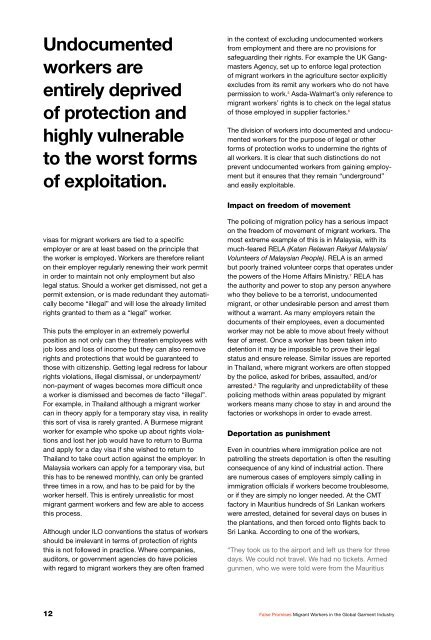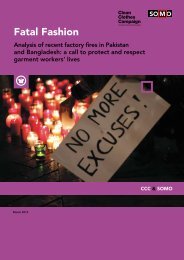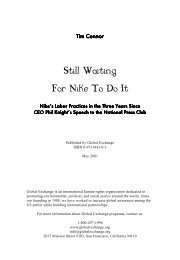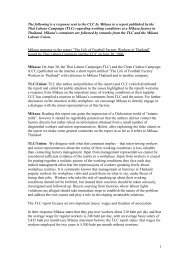Create successful ePaper yourself
Turn your PDF publications into a flip-book with our unique Google optimized e-Paper software.
Undocumented<br />
workers are<br />
entirely deprived<br />
of protection and<br />
highly vulnerable<br />
to the worst forms<br />
of exploitation.<br />
visas for migrant workers are tied to a specific<br />
employer or are at least based on the principle that<br />
the worker is employed. Workers are therefore reliant<br />
on their employer regularly renewing their work permit<br />
in order to maintain not only employment but also<br />
legal status. Should a worker get dismissed, not get a<br />
permit extension, or is made redundant they automatically<br />
become “illegal” and will lose the already limited<br />
rights granted to them as a “legal” worker.<br />
This puts the employer in an extremely powerful<br />
position as not only can they threaten employees with<br />
job loss and loss of income but they can also remove<br />
rights and protections that would be guaranteed to<br />
those with citizenship. Getting legal redress for labour<br />
rights violations, illegal dismissal, or underpayment/<br />
non-payment of wages becomes more difficult once<br />
a worker is dismissed and becomes de facto “illegal”.<br />
For example, in Thailand although a migrant worker<br />
can in theory apply for a temporary stay visa, in reality<br />
this sort of visa is rarely granted. A Burmese migrant<br />
worker for example who spoke up about rights violations<br />
and lost her job would have to return to Burma<br />
and apply for a day visa if she wished to return to<br />
Thailand to take court action against the employer. In<br />
Malaysia workers can apply for a temporary visa, but<br />
this has to be renewed monthly, can only be granted<br />
three times in a row, and has to be paid for by the<br />
worker herself. This is entirely unrealistic for most<br />
migrant garment workers and few are able to access<br />
this process.<br />
Although under ILO conventions the status of workers<br />
should be irrelevant in terms of protection of rights<br />
this is not followed in practice. Where companies,<br />
auditors, or government agencies do have policies<br />
with regard to migrant workers they are often framed<br />
in the context of excluding undocumented workers<br />
from employment and there are no provisions for<br />
safeguarding their rights. For example the UK Gangmasters<br />
Agency, set up to enforce legal protection<br />
of migrant workers in the agriculture sector explicitly<br />
excludes from its remit any workers who do not have<br />
permission to work. 5 Asda-Walmart’s only reference to<br />
migrant workers’ rights is to check on the legal status<br />
of those employed in supplier factories. 6<br />
The division of workers into documented and undocumented<br />
workers for the purpose of legal or other<br />
forms of protection works to undermine the rights of<br />
all workers. It is clear that such distinctions do not<br />
prevent undocumented workers from gaining employment<br />
but it ensures that they remain “underground”<br />
and easily exploitable.<br />
Impact on freedom of movement<br />
The policing of migration policy has a serious impact<br />
on the freedom of movement of migrant workers. The<br />
most extreme example of this is in Malaysia, with its<br />
much-feared RELA (Katan Relawan Rakyat Malaysia/<br />
Volunteers of Malaysian People). RELA is an armed<br />
but poorly trained volunteer corps that operates under<br />
the powers of the Home Affairs Ministry. 7 RELA has<br />
the authority and power to stop any person anywhere<br />
who they believe to be a terrorist, undocumented<br />
migrant, or other undesirable person and arrest them<br />
without a warrant. As many employers retain the<br />
documents of their employees, even a documented<br />
worker may not be able to move about freely without<br />
fear of arrest. Once a worker has been taken into<br />
detention it may be impossible to prove their legal<br />
status and ensure release. Similar issues are reported<br />
in Thailand, where migrant workers are often stopped<br />
by the police, asked for bribes, assaulted, and/or<br />
arrested. 8 The regularity and unpredictability of these<br />
policing methods within areas populated by migrant<br />
workers means many chose to stay in and around the<br />
factories or workshops in order to evade arrest.<br />
Deportation as punishment<br />
Even in countries where immigration police are not<br />
patrolling the streets deportation is often the resulting<br />
consequence of any kind of industrial action. There<br />
are numerous cases of employers simply calling in<br />
immigration officials if workers become troublesome,<br />
or if they are simply no longer needed. At the CMT<br />
factory in Mauritius hundreds of Sri Lankan workers<br />
were arrested, detained for several days on buses in<br />
the plantations, and then forced onto flights back to<br />
Sri Lanka. According to one of the workers,<br />
“They took us to the airport and left us there for three<br />
days. We could not travel. We had no tickets. Armed<br />
gunmen, who we were told were from the Mauritius<br />
12 False Promises Migrant Workers in the Global Garment Industry





